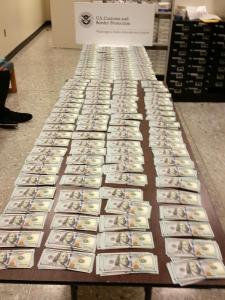CBP at Dulles airport seized $46,000 from a man traveling to Cameroon. He reported having $30,000, but CBP found $16,628 more tucked away inside his carry-on bag (ahem, bulk cash smuggling). The full story is here, with my comments on the excerpt below:
U.S. Customs and Border Protection (CBP) officers seized $46,628 in unreported currency (ahem, failure to report) from a man traveling to Cameroon at Washington Dulles International Airport on Monday.
CBP officers conducted random outbound inspections of passengers boarding a flight to Brussels, Belgium and asked a U.S. citizen how much currency he possessed. The man reported verbally that he had $30,000 and completed a U.S. Treasury Department form (FINCEN 105). During a subsequent examination of the man’s carry-on bags, CBP officers discovered a total of $46,628 in U.S. dollars.

. . .
CBP seized the currency and returned $628 to the man as humanitarian relief and released the man to continue his travel. CBP is not releasing the traveler’s name because he was not criminally charged.
Bad things can happen to you if you do not report your currency, read all about that at Long Term Consequences of Cash Seizure (or if you prefer to watch me talk about it, go to my YouTube video on the topic)
Has Dulles CBP seized your cash?
If Dulles CBP has seized your cash, we urge you to call us for a consultation before considering doing it yourself. You probably will not be happy with the outcome if you do, based on Dulles’ aggressive posture in most cases. Read our trusted customs money seizure legal guide (or watch the videos) and can contact us for a free currency seizure consultation by clicking the contact buttons on this page.










 dollars and $50 in Chinese Yen. During a baggage examination, the men handed a CBP officer two envelopes and a wallet that contained a total of $22,238.
dollars and $50 in Chinese Yen. During a baggage examination, the men handed a CBP officer two envelopes and a wallet that contained a total of $22,238.